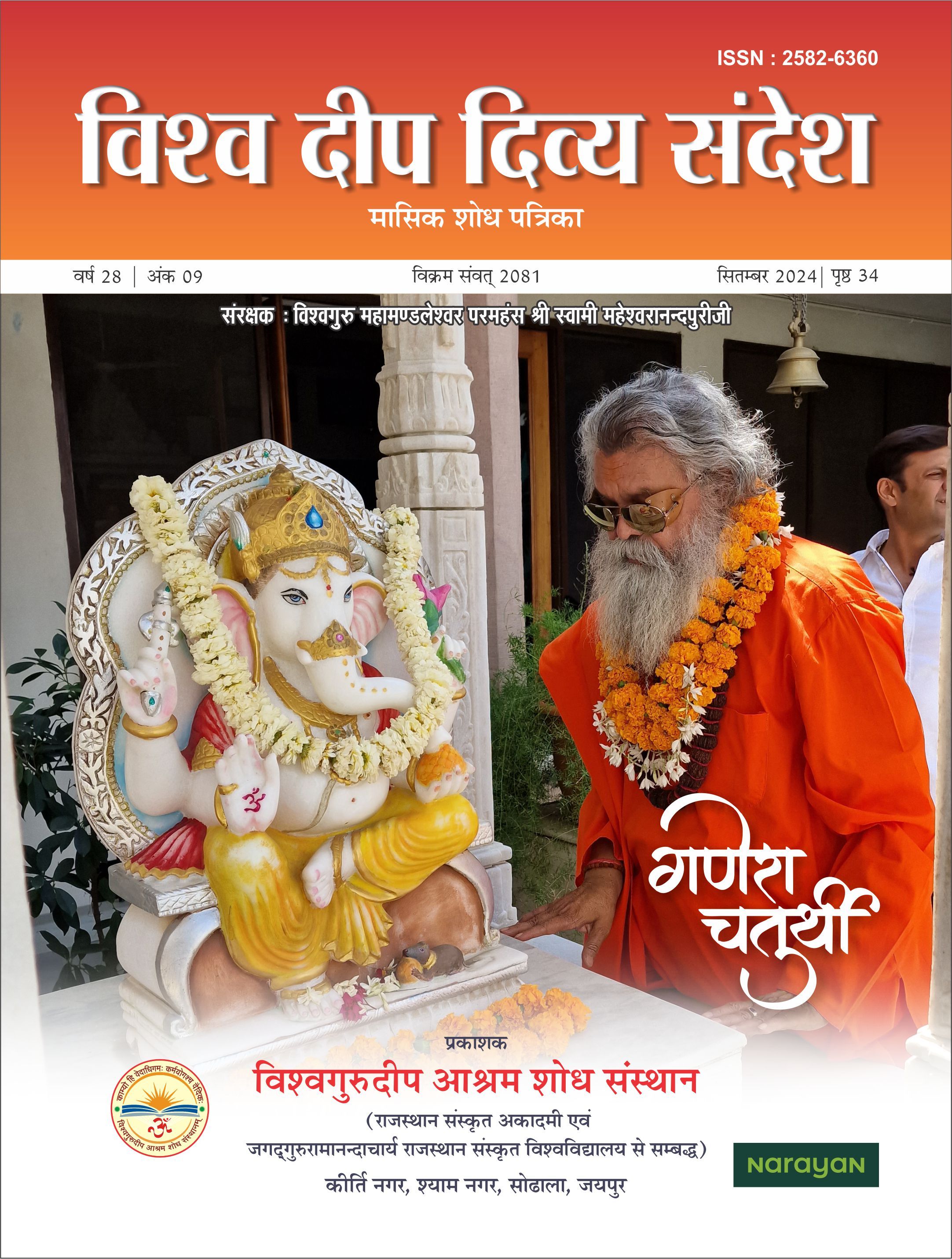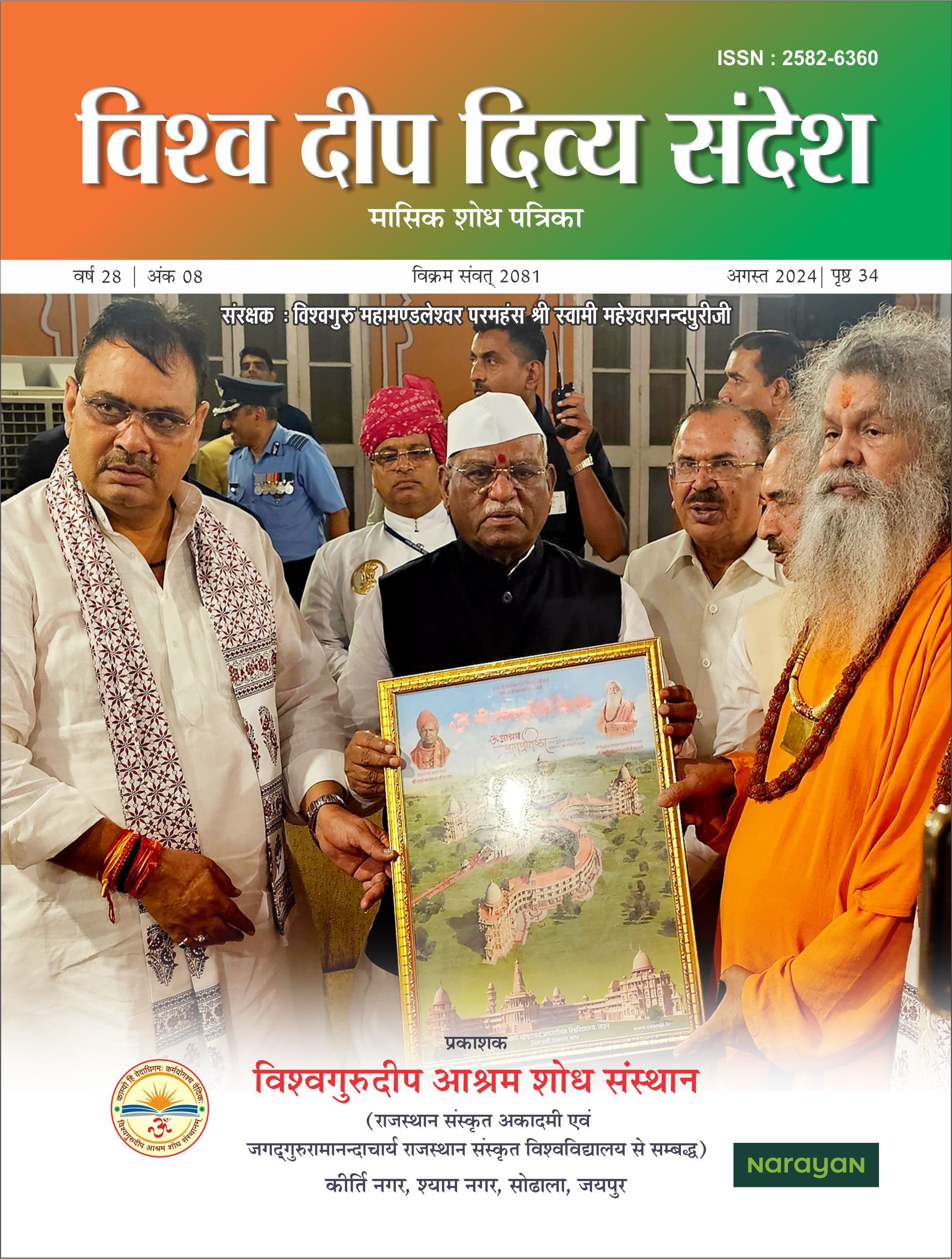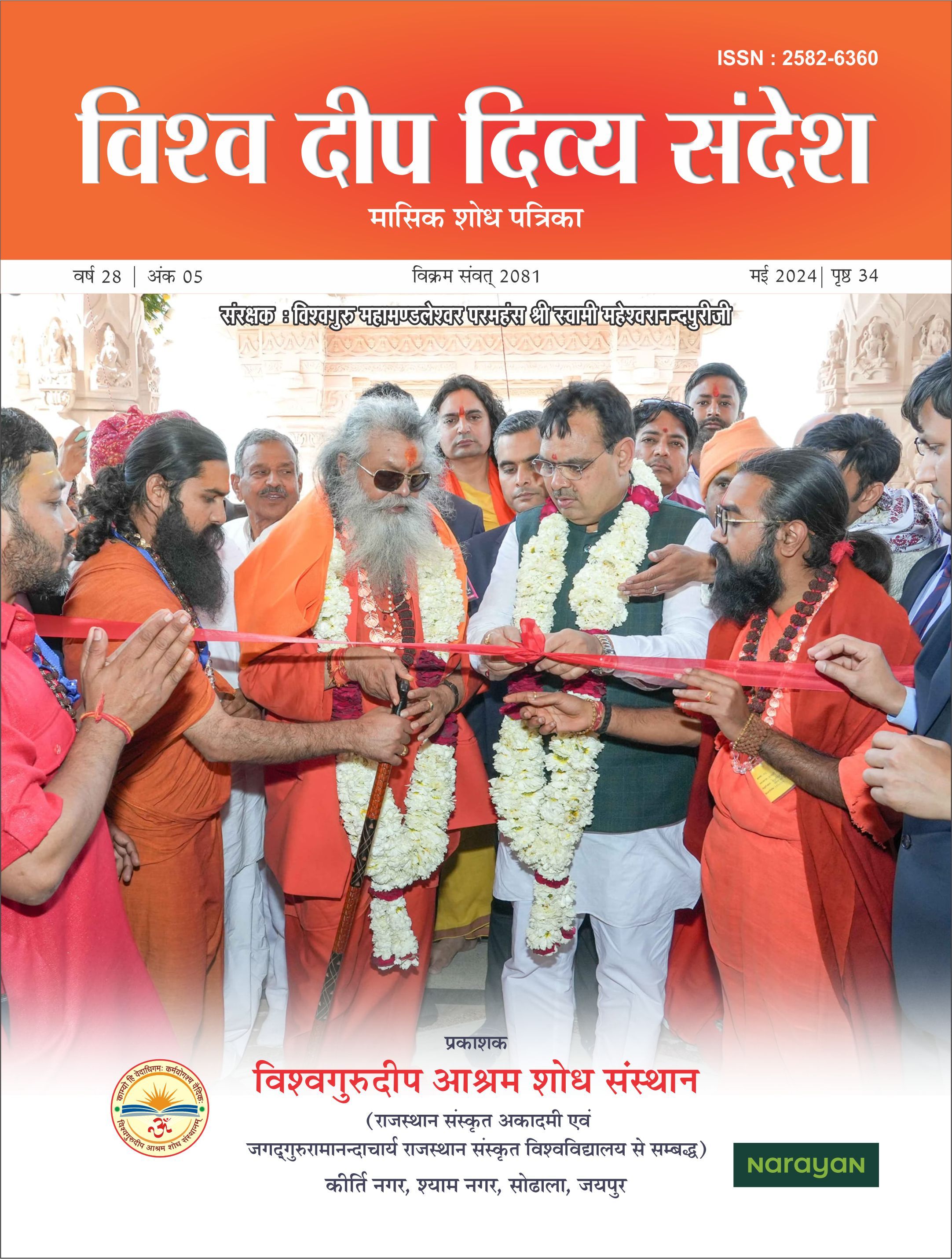- Home
- Activities
- Bhajan 8 - ABA TU HĪYO KOĪ MATA HĀRO JĪ
Bhajan 8 - ABA TU HĪYO KOĪ MATA HĀRO JĪ
This bhajan is composed by Bhagawan Sri Deep Narayan Mahaprabhuji, and can be found in the book Sri Deep Puri Anubhav Prakash.
अब तु हीयो कोई मत हारो जी, सब राम रटाने वाले ॥टेका॥
तुम श्रीनाथ को ध्यावो, शारद को सदा मनावो।
जीवों को मती सतावो जी, सब फतह कराने वाले॥१॥
तुम भला घरा का जाया, गुणवान घराना पाया।
भारत में जन्म धराया जी, सब साज सजाने वाले॥२॥
तुम प्रीत रखो सब भाई, द्वितीया को दूर हटाई।
तुम कोई रीस मत लाई जी, सत वचन सुनाने वाले॥३॥
तुम खावो खूब कमाओ, माया को खूब जुड़ाओ।
आपस में मती लड़ाओ जी, कछु लाज रखाने वाले॥४॥
तुम एक एक न चाओ, तुम तुरत भला फल पाओ।
कोई झगड़ो मती रचाओ जी, सब लोग हंसाने वाले॥५॥
तुम शील सतो गुण राखो, कोई कूड़ बचन मत भाखो।
रिश्वत निश्चै त्यागो जी, सत दीप बनाने वाले॥६॥
ABA TU HĪYO KOĪ MATA HĀRO JĪ, SABA RĀMA RAṬĀNE VĀLE (ṬEKĀ)
TUMA ŚRĪNĀTHA KO DHYĀVO, ŚĀRADA KO SADĀ MANĀVO.
JĪVÕ KO MATĪ SATĀVO JĪ, SABA PHATAHA KARĀNE VĀLE (1)
TUMA BHALĀ GHARĀ KĀ JĀYĀ, GUṆAVĀNA GHARĀNĀ PĀYĀ.
BHĀRATA MẼ JANMA DHARĀYĀ JĪ, SABA SĀJA SAJĀNE VĀLE (2)
TUMA PRĪTA RAKHO SABA BHĀĪ, DVITĪYĀ KO DŪRA HAṬĀĪ.
TUMA KOĪ RĪSA MATA LĀĪ JĪ, SATA VACANA SUNĀNE VĀLE (3)
TUMA KHĀVO KHŪBA KAMĀO, MĀYĀ KO KHŪBA JUḌĀO.
ĀPASA MẼ MATĪ LAḌĀO JĪ, KACHU LĀJA RAKHĀNE VĀLE (4)
TUMA EKA EKA NA CĀO, TUMA TURATA BHALĀ PHALA PĀO.
KOĪ JHAGAḌO MATĪ RACĀO JĪ, SABA LOGA HANSĀNE VĀLE (5)
TUMA ŚĪLA SATO GUṆA RĀKHO, KOĪ KŪḌA BACANA MATA BHĀKHO.
RIŚVATA NIŚCAI TYĀGO JĪ, SATA DĪPA BANĀNE VĀLE (6)
English Translation
Do not lose heart, now, all you who chant the name of Ram (God). (Refrain)
Meditate on Shrinath, always worship Sharada.
Do not torment living beings. All bring success. (1)
You were born into a good family, a virtuous household.
You were born in India, where all is enriched by everyone. (2)
O brothers, keep the love for all; remove duality.
Do not envy. Always speak the truth. (3)
Eat well and, earn abundantly, gather plenty of wealth.
Do not quarrel among yourselves; maintain some dignity. (4)
Do not desire only for yourself; you will receive good results immediately.
Do not create any quarrels; all should bring joy. (5)
Maintain virtues of modesty and truth, and do not speak false words.
Renounce corruption! Sri Deep shows the truth. (6)
Translation
Line 1
Original Line: अब तु हीयो कोई मत हारो जी, सब राम रटाने वाले॥टेका॥
Roman Transliteration: aba tu hīyo koī mata hāro jī, saba rāma raṭāne vāle (ṭekā)
Sentence-level Translation: Now, do not lose heart, all you who chant the name of Rama. (Refrain)
Deeper Explanation: This line encourages individuals to stay strong and resilient, particularly those devoted to chanting and remembering the name of Rama. In Hinduism, the name Rama does not represent only Lord Rama, Maryada Purushottama, but any god or guru. The word "ṭekā" at the end signifies a refrain or chorus in a bhajan.
Word-by-word Translation and Explanation:
अब (Aba) - Now, Currently; तु (tu) - You, Yourself; हीयो (hīyo) - Heart, Spirit (colloquial form of "hīyā"); कोई (koī) - Any, Anyone; मत (mata) - Do not, Don't; हारो (hāro) - Lose, Surrender; जी (jī) - A respectful suffix, Sir/Madam; सब (sab) - All, Everyone; राम (Rāma) - Lord Rama. Name of Rāmcandra (the seventh avatār of Viṣṇu); रटाने (raṭāne) - Chanting, Reciting; वाले (vāle) - Those who do, Practitioners.
Line 2
Original Line: तुम श्रीनाथ को ध्यावो, शारद को सदा मनावो।
Roman Transliteration: tuma śrīnātha ko dhyāvo, śārada ko sadā manāvo.
Sentence-level Translation: Meditate on Shrinath; always worship Sharada.
Deeper Explanation: This line advises devotees to meditate on Shrinath (a form of Krishna) and always worship the goddess Sharada. Sharada is another name for Saraswati, the goddess of knowledge and truth. It is said that people should speak only the truth and good things, as Saraswati comes once a day and makes our speech come true.
Word-by-word Translation and Explanation:
तुम (tum) - You, Thou; श्रीनाथ (Śrīnāth) - Lord Shrinath (a form of Krishna); को (ko) - To, For; ध्यावो (dhyāvo) - Meditate, Contemplate; शारद (Śārad) - Sharada (another name for Goddess Saraswati); सदा (sadā) - Always, Forever; मनावो (manāvo) - Worship, Appease.
Line 3
Original Line: जीवों को मती सतावो जी, सब फतह कराने वाले॥१॥
Roman Transliteration: jīvõ ko matī satāvo jī, saba phataha karāne vāle (1)
Sentence-level Translation: Do not torment living beings, all bring success.
Deeper Explanation: The line encourages compassion towards all living beings and highlights that true victory lies in kindness and righteousness.
Word-by-word Translation and Explanation:
जीवों (jīvõ) - Living beings, Creatures; को (ko) - To, For; मती (matī) - Do not, Refrain; निषेधवाचक शब्द, न नहीं, मत; - सतावो (satāvo) - Torment, Harass; जी (jī) - Respectful suffix, Sir/Madam; सब (sab) - All, Everyone; फतह (fatah) Noun, Feminine [from Arabic: फंतह] - Victory, Triumph, success; कराने (karāne) - Bringing about, Achieving; वाले (vāle) - Those who do.
Line 4
Original Line: तुम भला घरा का जाया, गुणवान घराना पाया।
Roman Transliteration: tuma bhalā gharā kā jāyā, guṇavāna gharānā pāyā.
Sentence-level Translation: You were born into a good family; a virtuous household.
Deeper Explanation: This line praises the listener for being born into a respectable family and encourages them to uphold and cherish the virtues of their lineage.
Word-by-word Translation and Explanation:
तुम (tum) - You, Yourself; भला (bhalā) - Good, Noble; घरा (gharā) - Family, Household; का (kā) - Of, Belonging to; जाया (jāyā) - Born, Begotten; गुणवान (guṇvān) - Virtuous, Noble; घराना (gharānā) - Household, Family; पाया (pāyā) - Acquired, Achieved.
Line 5
Original Line: भारत में जन्म धराया जी, सब साज सजाने वाले॥२॥
Roman Transliteration: bhārata mẽ janma dharāyā jī, saba sāja sajāne vāle (2)
Sentence-level Translation: You were born in India, where all is enriched by everyone.
Deeper Explanation: This line expresses pride in being born in India, a land rich in culture and tradition, and acknowledges those who contribute to beautifying the world around them.
Word-by-word Translation and Explanation:
भारत (Bhārat) - India, Bharat; में (meṃ) - In, Within; जन्म (janm) - Birth, Existence; धराया (dharāyā) - Taken (Born), Established; जी (jī) - Respectful suffix, Sir/Madam; सब (sab) - All, Everyone; साज (sāj) - Decoration, Ornamentation; सजाने (sajāne) - Adorning, Decorating; वाले (vāle) - Those who do, Practitioners
Line 6
Original Line: तुम प्रीत रखो सब भाई, द्वितीया को दूर हटाई।
Roman Transliteration: tuma prīta rakho saba bhāī, dvitīyā ko dūra haṭāī.
Sentence-level Translation: O brothers, keep love for all, remove duality.
Deeper Explanation: This line urges one to maintain love and unity among all people, viewing everyone as equals, and to eliminate any sense of duality or division.
Word-by-word Translation and Explanation:
तुम (tum) - You, Yourself; प्रीत (prīt) - Love, Affection; रखो (rakho) - Keep, Maintain; सब (sab) - All, Everyone; भाई (bhāī) - Brother, Sibling, in bhajans used to address the audience; द्वितीया (dvitīyā) - Duality, others-ness; को (ko) - To, For; दूर (dūr) - Far, Away; हटाई (haṭāī) - Remove, Eliminate;
Line 7
Original Line: तुम कोई रीस मत लाई जी, सत वचन सुनाने वाले॥३॥
Roman Transliteration: tuma koī rīsa mata lāī jī, sata vacana sunāne vāle (3)
Sentence-level Translation: Do not envy, always speak the truth.
Deeper Explanation: This line advises against harboring envy and encourages speaking truthfully, highlighting the virtue of honesty.
Word-by-word Translation and Explanation:
तुम (tum) - You, Yourself; कोई (koī) - Any, Anyone; रीस (rīs) - Envy, Jealousy; मत (mat) - Do not, Don't; लाई (lāī) - Bring, Carry; जी (jī) - Respectful suffix, Sir/Madam; सत (sat) - Truth, Reality; वचन (vacan) - Words, Speech; सुनाने (sunāne) - Speaking, Telling; वाले (vāle) - Those who do, Practitioners.
Line 8
Original Line: तुम खावो खूब कमाओ, माया को खूब जुड़ाओ।
Roman Transliteration: Tum khāvo khūb kamāo, māyā ko khūb juḍāo.
Sentence-level Translation: Eat well and earn abundantly, gather plenty of wealth.
Deeper Explanation: This line encourages individuals to enjoy their life by eating well and earning a good living, and to accumulate wealth responsibly.
Word-by-word Translation and Explanation:
तुम (tum) - You, Yourself; खावो (khāvo) - Eat, Consume; खूब (khūb) - Well, Abundantly. कमाओ (kamāo) - Earn, Gain. माया (māyā) - Wealth, Illusion; को (ko) - To, For; खूब (khūb) - Plenty, Abundantly; जुड़ाओ (juḍāo) - Gather, Accumulate
Line 9
Original Line: आपस में मती लड़ाओ जी, कछु लाज रखाने वाले॥४॥
Roman Transliteration: āpasa mẽ matī laḍāo jī, kachu lāja rakhāne vāle (4)
Sentence-level Translation: Do not quarrel among yourselves, maintain some dignity.
Deeper Explanation: This line emphasises maintaining harmony and dignity by avoiding conflicts with one another.
Word-by-word Translation and Explanation:
आपस (āpasa) - Among yourselves, Interpersonal; में (meṃ) - In, Within; मती (matī) - Do not, Refrain; लड़ाओ (laḍāo) - Quarrel, Fight; जी (jī) - Respectful suffix, Sir/Madam; कछु (kachhu) - Some, A little; लाज (lāja) - Dignity, Honor 1. shame; a sense of decency or modesty. 2. bashfulness. 3. transf. honour, good name; रखाने (rakhāne) - Maintaining, Preserving; वाले (vāle) - Those who do, Practitioners
Line 10
Original Line: तुम एक एक न चाओ, तुम तुरत भला फल पाओ।
Roman Transliteration: tuma eka eka na cāo, tuma turata bhalā phala pāo.
Sentence-level Translation: Do not desire only for yourself; you will receive good results immediately.
Deeper Explanation: This line advises against individualistic desires and assures that collective effort and unity yield good results quickly.
Word-by-word Translation and Explanation:
तुम (tum) - You, Yourself; एक एक (ek ek) - Individually, One by one; न (na) - Do not, Don't; चाओ (chāo) - Desire, Wish; तुम (tum) - You, Yourself; तुरत (turat) - Immediately, Instantly; भला (bhalā) - Good, Favorable; फल (phal) - Result, Outcome; पाओ (pāo) - Receive, Obtain;
Line 11
Original Line: कोई झगड़ो मती रचाओ जी, सब लोग हंसाने वाले॥५॥
Roman Transliteration: koī jhagaḍo matī racāo jī, saba loga hansāne vāle (5)
Sentence-level Translation: Do not create any quarrels, all should bring joy.
Deeper Explanation: This line encourages maintaining peace and harmony, avoiding conflicts, and emphasises bringing joy to everyone.
Word-by-word Translation and Explanation:
कोई (koī) - Any, Anyone; झगड़ो (jhagaḍo) - Quarrels, Conflicts; मती (matī) - Do not, Refrain; रचाओ (rachāo) - Create, Form; जी (jī) - Respectful suffix, Sir/Madam; सब (sab) - All, Everyone; लोग (log) - People, Folks; हंसाने (hansāne) - To bring joy, To make laugh; १. दूसरे को हँसने में प्रवृत्त करना । कोई ऐसी बात करना जिससे दूसरा हँसे। २. आनंदित करना । खुश करना । प्रसन्न करना । - वाले (vāle) - Those who do, Practitioners
Line 12
Original Line: तुम शील सतो गुण राखो, कोई कूड़ बचन मत भाखो।
Roman Transliteration: tuma śīla sato guṇa rākho, koī kūḍa bacana mata bhākho.
Sentence-level Translation: Be virtuous; do not speak false words.
Deeper Explanation: This line emphasizes the importance of maintaining virtues like modesty and truthfulness and advises against speaking falsehoods.
Word-by-word Translation and Explanation:
तुम (tum) - You, Yourself; शील (śīla) - 1. character, nature. 2. virtuous nature; virtuous, moral or decent conduct. 3. morality. 4. moral quality or principle;
सतो (sato) - Truth, Integrity गुण (guṇa) - Qualities, Virtues; सतोगुण satōguṇa (nm) virtue, the quality of purity and goodness; one of the three guṉas (see सत्त्व, रजस् and तमस्); ~णी having the qualities of goodness and purity, virtuous; - राखो (rākho) - Maintain, Preserve; कोई (koī) - Any, Anyone; कूड़ (kūṛa) - False, Untrue; कूड़ा kūṛā [kūṭa-2], m. 1. rubbish, sweepings; dirt. 2. useless object(s), rubbish; बचन (bacana) - Words, Speech; मत (mat) - Do not, Refrain; भाखो (bhākho) - Speak, Utter
Line 13
Original Line: रिश्वत निश्चै त्यागो जी, सत दीप बनाने वाले॥६॥
Roman Transliteration: riśvata niścai tyāgo jī, sata dīpa banāne vāle (6)
Sentence-level Translation: Renounce corruption! Sri Deep shows the truth.
Deeper Explanation: This line advises against bribery and corruption and encourages the pursuit of truth and integrity. Here, Sri Deep Narayan Mahaprabhuji says that those who follow his teachings will come to reality.
Word-by-word Translation and Explanation:
रिश्वत (riśvata) - Bribery, Corruption; निश्चै (niścai) - Certainly, Surely; त्यागो (tyāgo) - Renounce, Give up; जी (jī) - Respectful suffix, Sir/Madam; सत (sat) - Truth, Reality; दीप (Dīpa) - Refers to Sri Deep Narayan Mahaprabhuji; light (as a metaphor); बनाने (banāne) - Creating, Making; वाले (vāle) - Those who do, Practitioners.






